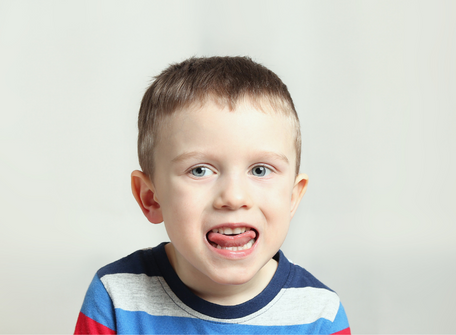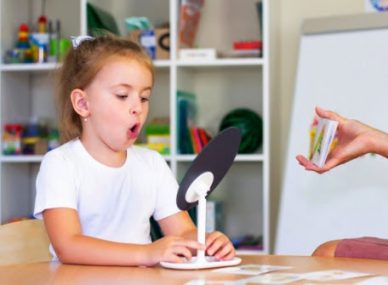In the field of speech-language pathology, prompts and cues are part of the specialized language we learn. The two are on a par with fluency and aphasia. It is important to understand the difference between the two words since we use them often and probably interchangeably. Yes, there is a difference.
A prompt is defined as a series of instructions, gestures, demonstrations, touches, and/or other actions that increase the likelihood that children will make the correct response. The purpose of prompts is to direct the student towards the correct answer or response.
A cue is merely a hint and does not lead the child to the correct answer. When writing goals or reports, it is not advisable to use these words interchangeably. The primary reason for this is clarity. It is likely that when you write a goal and mention that a child is permitted ‘2 prompts’ before a trial is marked incorrect, you are referring to prompting ( providing hints and support for the child to get the correct answer) and cueing ( providing additional hints without directing the child to the correct answer), but someone else may not understand. It is not good for anyone if your child moves and the new SLP reads that they can only prompt them.
Children with speech disorders, strokes, injuries, or other illnesses require speech therapy or speech language pathology (SLP) to assess, diagnose, and develop individualized treatment plans.
How Can Speech Disorders Be Treated?
It is necessary to use speech therapy to treat a variety of speech and language disorders, including:
Articulation Disorders – A person who is unable to produce the correct sounds of certain words or who mispronounces them suffers from this condition. It is common for children with articulation disorders to swap, drop, add, or distort certain sounds within words.
Fluency Disorders – The child suffers from a speech disorder that affects the speed, flow, and rhythm of the child’s speech, such as cluttering and stuttering. Stuttering disorders are often characterized by partial-word repetitions, abnormal stoppages, and prolonged syllables and sounds in children. Children who clutter speak rapidly and often merge words together.
Voice/ Resonance Disorders – It is caused by a blockage of regular airflow in the oral or nasal cavity, which alters the vibrations, which affects the volume, pitch, and quality of speech. There is a link between it and swollen tonsils, cleft palates, and neurological disorders.
Aphasia – As a result of this communication disorder, the child is unable to understand and communicate with others. Reading and writing are difficult for children with this acquired disorder. A stroke is one of the most common causes of aphasia.
Dysarthria – As a result of children’s inability to control their speech muscles, they speak with slurred and slow speech. The cause of this speech disorder is a defect of the nervous system which results in a weakness of the tongue and a paralysis of the facial muscles.
Hope AMC Offers What Types of Speech Therapy Services?
For those of you who have been searching for “speech therapy near me” on Google for so long, your search has come to an end. Hope AMC’s speech-language therapists are highly skilled and trained. To improve the quality of their speech and language function, they assess and identify speech disorders and develop personalized treatment plans for each patient.
We work with children of all ages (infants, toddlers, preschoolers, and school-age children). We provide the following speech therapy services:
- Childhood Apraxia of Speech
- Speech Sound Delay/Disorder
- Stammering/ Stuttering Intervention
- Accent Modification
- Speech Therapy for cleft lip and palate
- Pediatric Speech Therapy
- Aphasia Speech Therapy
- Feeding and Swallowing Disorder
- Language Delay
- Developmental Language Disorder
- Pragmatic Language Disorder
- Articulation Disorders
- Resonance/ Voice Disorders
- Autism Spectrum Condition
- Cerebral Palsy
- Chromosomal/Genetic Disorders
- Global Developmental Delay
- Hearing Impairment
How Does Speech Therapy Work?
In order to determine the type of speech disorder, its possible causes, and the appropriate treatment, speech and language therapists conduct an initial assessment. There are several factors that affect the success of speech therapy in Dubai, including your age and type of language disorder.
Depending on the type of speech disorder, speech therapy Dubai may be conducted in small groups, classrooms, or one-to-one with children. It usually includes a variety of activities, games, and exercises depending on your child’s age, disorder, and specific needs. As part of language intervention, speech therapists may interact with kids either through play, talking, or using pictures and books. To teach children how to make the correct sounds, they may also model the correct syllables and sounds.
Speech Therapy At Hope Amc: How Does It Work?
We provide prompt speech therapy Dubai at Hope AMC. Before recommending any treatment plan, our speech therapists conduct a thorough assessment of each child’s specific needs. With pediatric speech therapy Dubai, our experienced and trained SLAs build on the strengths of the child.
Aside from offering individual or group intervention, we also advise parents on how to assist their children with their primary speech, language, and communication difficulties. Further, our speech and language therapists are available to support parents and caregivers in carrying out activities at home. It is also recommended that nursery or school teachers implement a variety of techniques.
Having substantial experience, training, and certification, our speech therapists can provide appropriate therapeutic approaches and develop tailored intervention plans to meet the individual needs of children and their families.
What Makes Hope Amc The Best Speech Therapy Center?
Children and their parents may experience distress when speech and language delays affect their social interaction and personality development. In recognition of this fact, the speech therapists at Hope AMC go the extra mile to provide your children with evidence-based diagnoses and treatment plans that incorporate the best speech therapy available. Providing tailored speech therapy exercises is the responsibility of our highly compassionate, experienced, and knowledgeable speech and language therapists.






